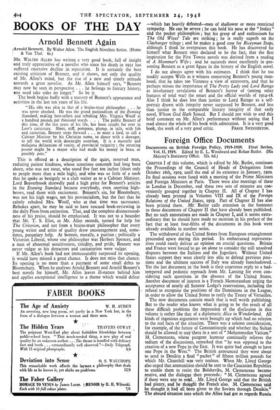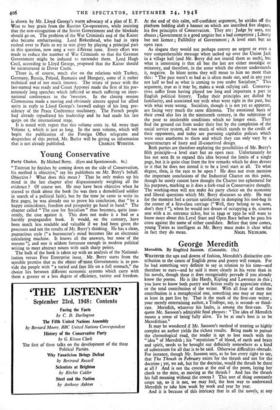Foreign Office Documents
CHAPTER I of this volume, which is edited by Mr. Butler, continues the Proceedings of the. Council of Heads of Delegations from October 16th, 1919, untit the end of its existence in January, 1920. Its final sessions were fused with a meeting of the Prime Ministers and Foreign Ministers at Paris. There, were also meetings of these in London in December, and these two sets of minutes are con- veniently grouped together in Chapter II. All of Chapter I has already been printed in Volumes VIII and IX of the Foreign Relations of the United States, 1919. Part of Chapter II has also been printed there. MY.' Butler calls attention in the footnotes to those documents of Chapter II that have already been published. But no such annotations are made in Chapter I, and it seems extra- ordinary that he should have made no mention in his preface of the fact that at least four-fifths of the documents in this book were already available in another series.
The withdrawal of the United States from European entanglement proceeded apace during this period. Its embarrassed representa- tives could rarely deliver -an opinion on crucial questions. Britain and France were forcedlto go on alone to consider the still unsolved disputes between the Italians and the Jugoslays. Without United States support they were clearly less able to defend previous posi- tions and the ultimate success of Italy was already foreshadowed. — Yet the last document in the book is their courteous reply to a bad- tempered and pedantic reproach from Mr. Lansing for even con- sidering such questions in the absence of the United States. Another document of interest is a French Memorandum urging the acceptance of nearly all Senator Lodge's reservations, including the refusal to recognise the positions of the Dominions in the League, in order to allow the United States to ratify the Treaty of Versailles.
The new documents contain much that is well worth publishing. But to the reader who knows what is going to be the. result of all these difficult problems the impression of the discbssion in this volume is rather like that of a diplomatic Alice in Wonderland. All kinds of ingenious arguments were brought up which had no relation to the real facts of the situation. There was a solemn consideration, for example, of the future of Constantinople and whether the Sultan should be allowed to stifthere in a sort of "Mohammedan Vatican." M. Clemenceau, whose pungent humour continually relieves the tedium of the discussions, remarked that "he was opposed to the creation of a new Pope in the East. It was quite bad enough to have one Pope in the West.", The British announced they were about to send to Denikin a final " packet " Of fifteen million pounds for which Mr. Churchill Wail.' very zealous. When Mr. Lloyd George also urged that ammunition should be sent to the Caucasian Republics to enable them to resist the Bolsheviks, M. Clemenceau became restive, and the dialogue then proceeds: "M. Clemenceau agreed if there were any to scald. Mr. Lloyd George said that the British had plenty, and he thoiigift the French-also. M. Clement-eau said he thought it had all been given to the Soviets through Denildn." The absurd situation into which the Allies had got as regards Russia.
is shown by Mr. Lloyd George's warm advocacy of a plan of E. F. Wise to buy grain from the Russian Co-operatives, while insisting that the non-recognition of the Soviet Government and the blockade should go on. The problem of the War Criminals and of the Kaiser also became embarrassing. Lord Birkenhead, who had in 1919 rushed over to Paris to try to win glory by playing a principal part in this question, now sang a very different tune. Every effort was made to reduce the number of War Criminals so that the German Government might be induced to surrender them. Lord Hugh Cecil, according to Lloyd George, proposed that the Kaiser should be incarcerated in Dover Castle.
There is, of course, much else on the relations with Turkey, Germany, Russia, Poland, Rumania and Hungary, some of it rather technical and of not much interest. The treaty of peace with the last-named was ready and Count Apponyi made the first of his por- tentously long speeches which inflicted so much suffering on inter- national conferences in the 'twenties. In the closing session Clemenceau made a moving and obviously sincere appeal for allied unity in reply to Lloyd George's farewell eulogy of his long pre- sidency of the Peace Conference machinery. The French people had already repudiated his leadership and he had made his last quips on the international stage.
It is noted with regret that this volume costs 2s. 6d. more than Volume r, which is just as long. In the next volume, which will begin the publication of the Foreign Office telegrams and despatches of this period, Mr. Butler will be giving us information



































 Previous page
Previous page